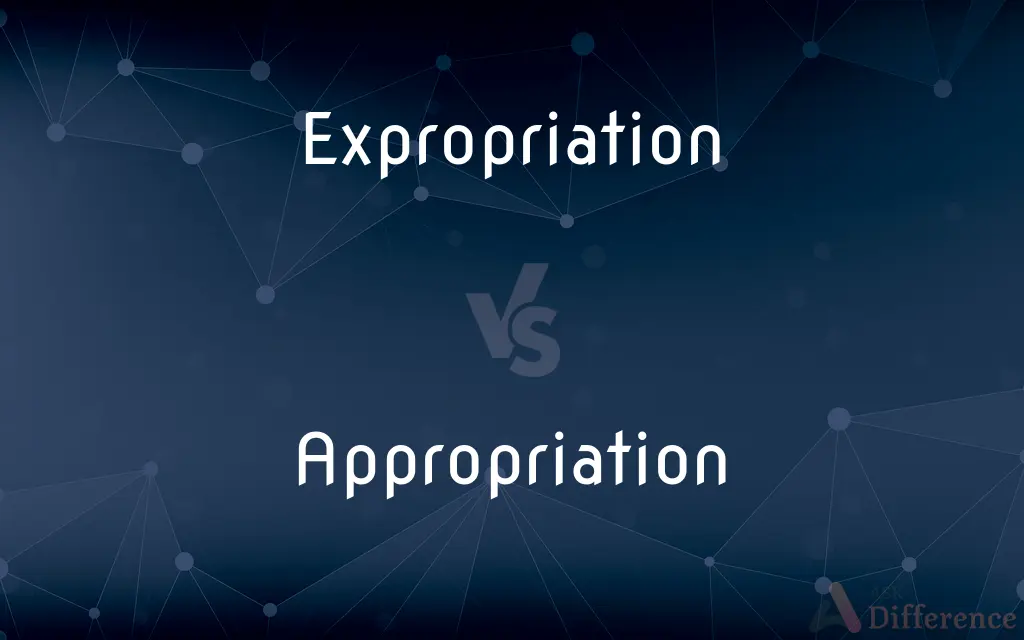Expropriation vs. Appropriation — What's the Difference?
By Urooj Arif & Maham Liaqat — Updated on April 20, 2024
Expropriation involves government seizure of property for public use, often with compensation, whereas appropriation generally refers to the unauthorized use of someone else's property or ideas.

Difference Between Expropriation and Appropriation
Table of Contents
ADVERTISEMENT
Key Differences
Expropriation is a legal process where a government takes private property for public purposes, typically with compensation to the owner. On the other hand, appropriation can occur without legal sanction and involves taking or using someone's property or ideas without permission.
While expropriation is often subject to strict legal procedures and is justified by public necessity, appropriation is more associated with cultural or artistic contexts and can lead to ethical and legal disputes.
Governments engage in expropriation to facilitate infrastructure projects, urban development, or for other community benefits. Conversely, appropriation is frequently seen in the arts, where creators incorporate elements of one culture or group without authority.
Expropriation requires that the former owners are compensated for their loss, which is intended to make them whole. Whereas in appropriation, there is typically no compensation or acknowledgment given to the original source.
The debate surrounding expropriation focuses on the fairness of compensation and the necessity of taking property. In contrast, discussions about appropriation often center on issues of cultural sensitivity, consent, and the implications for the groups whose materials or ideas are used.
ADVERTISEMENT
Comparison Chart
Definition
Legal process of taking private property by government
Unauthorized use of others' property or ideas
Legal Framework
Governed by law, requires compensation
Often lacks legal sanction, no compensation
Common Contexts
Urban planning, public projects
Arts, culture
Compensation
Yes, typically required
No
Ethical/Legal Focus
Fairness and necessity of taking
Cultural sensitivity, consent
Compare with Definitions
Expropriation
May require judicial oversight.
Property owners contested the expropriation in court, seeking higher compensation.
Appropriation
Does not involve compensation.
The borrowed cultural elements were used without compensation to the community.
Expropriation
Regulated by legal statutes.
The laws governing expropriation ensure that the process is fair and just.
Appropriation
Common in artistic contexts.
Appropriation in art can blur the lines between homage and plagiarism.
Expropriation
Government act of taking private property for public use.
The city's expropriation of land for the new highway displaced several families.
Appropriation
Often criticized for ethical reasons.
Critics accused her of cultural appropriation for her fashion line.
Expropriation
Involves compensation to the original owner.
After expropriation, the government compensated the landowners.
Appropriation
Taking something without permission, especially cultural elements.
His artwork involved the appropriation of indigenous symbols.
Expropriation
Usually associated with infrastructure development.
Expropriation often occurs to build public amenities like parks or schools.
Appropriation
Can lead to controversy and debate.
The film sparked debate over its appropriation of historical events.
Expropriation
To take (a property) for public use.
Appropriation
The act of appropriating.
Expropriation
The act of expropriating; the surrender of a claim to private property; the act of depriving of private propriety rights.
Appropriation
Something appropriated, especially public funds set aside for a specific purpose.
Expropriation
The act of expropriating; the surrender of a claim to exclusive property; the act of depriving of ownership or proprietary rights.
The expropriation of bad landlords.
Appropriation
A legislative act authorizing the expenditure of a designated amount of public funds for a specific purpose.
Expropriation
Taking out of an owner's hands (especially taking property by public authority)
Appropriation
An act or instance of appropriating.
Appropriation
That which is appropriated.
Appropriation
Public funds set aside for a specific purpose.
Appropriation
(arts) The use of borrowed elements in the creation of a new work.
Appropriation
(sociology) The assimilation of concepts into a governing framework.
Appropriation
In church law, the making over of a benefice to an owner who receives the tithes, but is bound to appoint a vicar for the spiritual service of the parish.
Appropriation
The principle that supplies granted by a legislature are only to be expended in the manner specified by that legislature.
Appropriation
The act of setting apart or assigning to a particular use or person, or of taking to one's self, in exclusion of all others; application to a special use or purpose, as of a piece of ground for a park, or of money to carry out some object.
Appropriation
Anything, especially money, thus set apart.
The Commons watched carefully over the appropriation.
Appropriation
The severing or sequestering of a benefice to the perpetual use of a spiritual corporation. Blackstone.
Appropriation
Money set aside (as by a legislature) for a specific purpose
Appropriation
Incorporation by joining or uniting
Appropriation
A deliberate act of acquisition
Common Curiosities
Why is appropriation controversial?
It's controversial because it can involve using cultural symbols without understanding or respecting their significance.
What is appropriation?
Appropriation involves taking or using someone else’s property or ideas without permission, often in cultural or artistic contexts.
Can appropriation be a form of flattery?
Some argue that imitation is a form of flattery, but when it comes to cultural appropriation, it often carries implications of disrespect.
How is expropriation justified?
It is justified by public necessity and is regulated by laws that aim to ensure fairness and compensation.
What types of property can be expropriated?
Land, buildings, and other physical properties can be expropriated for public projects like roads or schools.
Can appropriation ever be legal?
It can be legal when it falls under fair use in artistic contexts, though this can still be ethically disputed.
How do artists defend their use of appropriation?
Artists might argue that appropriation is a vital tool for creativity and commentary in art.
What is expropriation?
It's when the government legally takes private property for public use, usually with compensation.
Who decides what constitutes a public need in expropriation?
Typically, government agencies or legislative bodies determine the public necessity driving the expropriation.
How is compensation determined in expropriation cases?
Compensation is typically based on the market value of the property at the time of expropriation.
Share Your Discovery

Previous Comparison
Mean vs. Expectation
Next Comparison
Nostalgia vs. WistfulAuthor Spotlight
Written by
Urooj ArifUrooj is a skilled content writer at Ask Difference, known for her exceptional ability to simplify complex topics into engaging and informative content. With a passion for research and a flair for clear, concise writing, she consistently delivers articles that resonate with our diverse audience.
Co-written by
Maham Liaqat















































